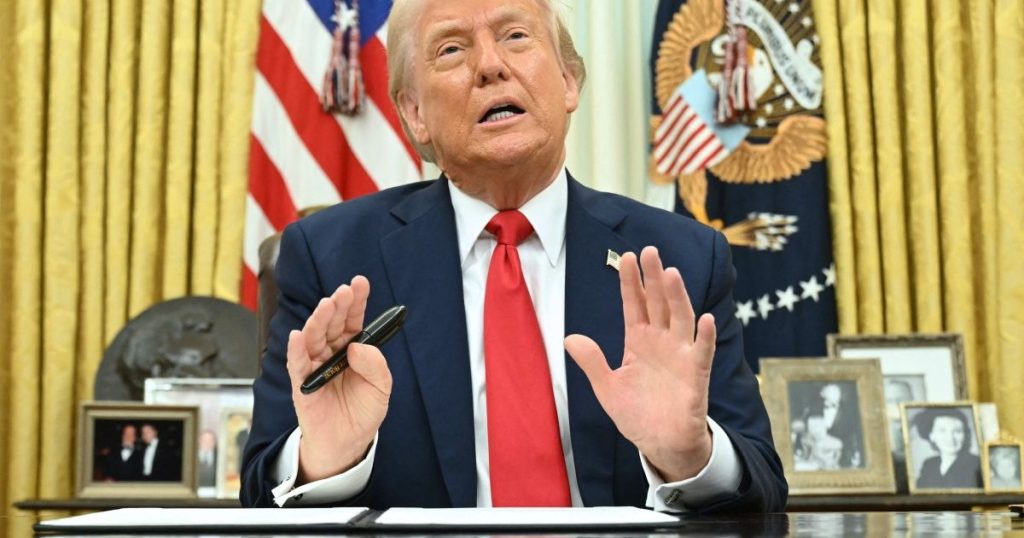In a move that has sent ripples through the global trade landscape, former US President Donald Trump, in a hypothetical 2025 scenario, announced the implementation of the “Universal Baseline Tariff.” This policy levied a 10% tax on all imports into the United States, with the potential for additional reciprocal tariffs against countries deemed to engage in unfair trade practices. While crude oil and energy-related products were exempted, the tariff placed a significant portion of Nigeria’s non-oil exports, valued at N323.96 billion in 2024, at risk. This action threatened to undermine Nigeria’s efforts to diversify its export portfolio and reduce its reliance on crude oil.
Nigeria’s export profile to the US in 2024 was heavily skewed towards crude oil and energy products, which accounted for N4.49 trillion. This dominance insulated the country’s largest export sector from the immediate impact of the new tariffs. However, the burgeoning non-oil export sector, which had witnessed growth in both volume and variety, found itself directly in the crosshairs. This sector encompassed a range of products, including agricultural goods like cocoa beans and soya meals, industrial materials like refined lead and natural rubber, and manufactured goods like urea fertilizer.
A quarterly breakdown of Nigeria’s non-oil exports reveals a dynamic but vulnerable trade picture. The first quarter of 2024 saw exports of N74.79 billion, dominated by soya meals, urea, and refined lead. The second quarter witnessed a surge to N123.23 billion, driven primarily by a significant increase in urea exports. The third quarter saw a slight dip to N84.38 billion, with urea remaining the leading export, complemented by refined lead and the emergence of cocoa beans. Finally, the fourth quarter recorded the lowest export value at N42.55 billion, although superior quality cocoa beans took the lead. This fluctuating performance highlighted the sector’s nascent stage and its susceptibility to external shocks like the newly imposed tariffs.
The “Universal Baseline Tariff” posed a significant challenge to the competitiveness of Nigerian non-oil exports in the US market. Urea, the largest non-oil export item at N146.06 billion, faced the risk of losing market share to cheaper alternatives. Cocoa beans, with an export value of N44.40 billion, faced similar threats, potentially impacting Nigeria’s participation in the global confectionery industry. Refined lead, soya meals, and natural rubber, each contributing significantly to Nigeria’s non-oil export earnings, also faced potential displacement by competitors from countries not subject to the new tariffs. The imposition of the tariff threatened to stifle the growth and diversification of Nigeria’s export sector, potentially pushing the country back towards its dependence on crude oil.
Reactions to the tariff implementation were varied. Trump defended the policy as a means to revitalize American manufacturing and reduce reliance on foreign goods. The US Trade Representative cited Nigeria’s import ban on 25 product categories as a justification for the tariff, arguing it restricted market access for US exporters. Nigeria’s Minister of Industry, Trade, and Investment acknowledged the potential negative impact on Nigerian goods, particularly in emerging and value-added sectors crucial for economic diversification. The Minister of Finance, however, downplayed the tariff’s potential effect, emphasizing the exemption of oil and mineral exports and pointing to higher tariffs imposed on other countries.
The long-term implications of the tariff remained uncertain. While the Nigerian government expressed confidence in its ability to weather the storm, economic experts voiced concerns about the potential ripple effects on the Nigerian economy. Beyond the immediate impact on non-oil exports, they warned of potential consequences for consumer prices, manufacturing activity, international trade, and even the demand for Nigerian oil in the US market. The tariff highlighted the growing trend of protectionism in global trade and the challenges faced by developing economies like Nigeria in navigating an increasingly uncertain international economic landscape. The situation underscores the urgency for Nigeria to further diversify its economy, explore new markets, and strengthen regional trade partnerships to mitigate the risks associated with volatile global trade policies.














